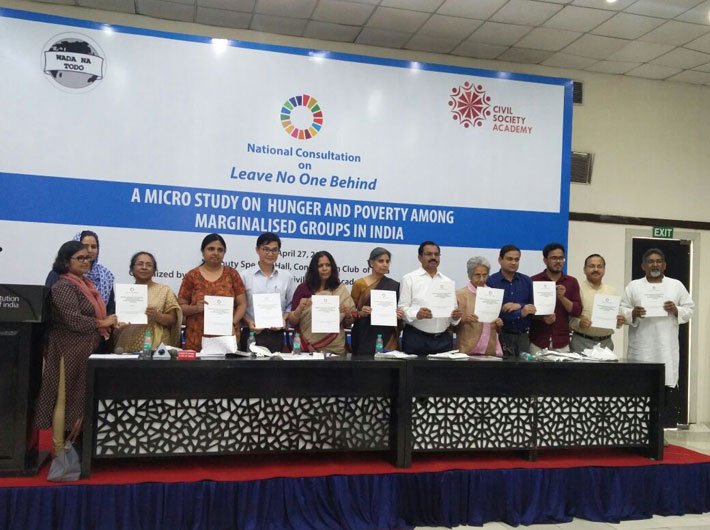It took four years for Rahila Khan, a Muslim woman from Himachal Pradesh, to get a ration card after her husband passed away. She is a single woman who is entitled to the benefits of Antodoya Anna Yojana (35 kg of subsidised rice per household per month) under the National Food Security Act (NFSA). She had to make rounds in many offices and approached many people to get a card.
Saudamini from West Bengal (name changed) was married ten years ago and had a baby after two years of her marriage. The husband eventually sold her to someone in Delhi, but somehow she managed to go back to Kolkata. With no easy option of livelihood available for her, she ended up becoming a sex-worker. She has not got a ration card, as she is demanded to produce documentary proof of her residence and identity. But she has none.
During the recent release of the “Micro study on hunger and poverty among marginalized groups in India”, carried out by Wada Na Todo Abhiyan, a national campaign on governance and accountability, people from several vulnerable groups like the Muslim, women from urban slums, Musahars (Mahadalits in Bihar), sex-workers, migrants, Tribals etc. testified their plight of exclusion from the food security net. The study is done in context of the Leave No One Behind slogan under the Sustainable Development Goals (SDGs) or Agenda 2030.
NFSA provides for distribution of subsidised ration covering 75 percent population in rural areas and 50 percent in urban areas. It also includes the provisions of Integrated Child Development Services (ICDS), Mid-Day Meal (MDM) and at least Rs 6,000 for the pregnant and lactating women under the maternity benefit scheme.
In Manipur the situation is so different and alarming. Manipur is under the APFSPA (Armed Forces Special Power Act), which provides special powers to the army to prohibit large gathering and arrest without warrants etc. If there is any information of presence of any insurgents in a village, the army cordons the village and stops entry of ration to the area creating difficulties for the villagers. On the other, sometimes the insurgents come in large numbers, park in villages and demand cooked food from the villagers, which also drain their food stocks leaving in hunger.
Under the Loktak hydropower project in Manipur, Ithai barrage has been constructed on the Manipur river with Loktak lake being used as a reservoir. About 500 families living in around the lake have been denied any ration cards. Attempts are being made by the government to displace them form the area to develop it as a tourist place.
In Delhi slums, there are several cases of fingerprints not matching during Aadhaar authentication leading to denial of ration. This is very common for the labourers as they are involved in manual work impacting on their fingerprints.
Musahar communities in Bihar are categorized as Mahadalits (dalits among dalits). They are also present in eastern UP. The knowledge about their precarious situation is widely known. Most of them stay as bonded agricultural labour in some local landlord’s house and are paid meagre wages for their work. They actually are forced to a state of perennial indebtedness by an extortive system and are often denied adequate food leading to malnutrition.
Suleman from the Munda tribal community in Jharkhand does not have a ration card. He sells wood collected from the forest to fetch rice from the market. MGNREGA could have been a lifesaver in his case, which has been marred due to long delays in payment.
In Mumbai, there are some unauthorized colonies, like Mulauniambujwadi near Malad, where the inhabitants have no electricity or water bills, therefore no Aadhaar or ration card for them!
Out of 653 households of most left behind groups studied, 600 have Aadhaar cards, but 300 do not have a ration card. This also shows that Aadhaar is also not a guarantee for getting a ration card as claimed by government.
Three broad suggestions are made to bridge the gaps in implementation of NFSA. One, the requirement of documentary evidence providing a ration card should be made flexible. Two, Aadhaar should not be mandatorily linked to the ration entitlements. And three, the universalisation of food scheme is the need of the hours to remedy the exclusion of such marginalized groups from the food safety net.



